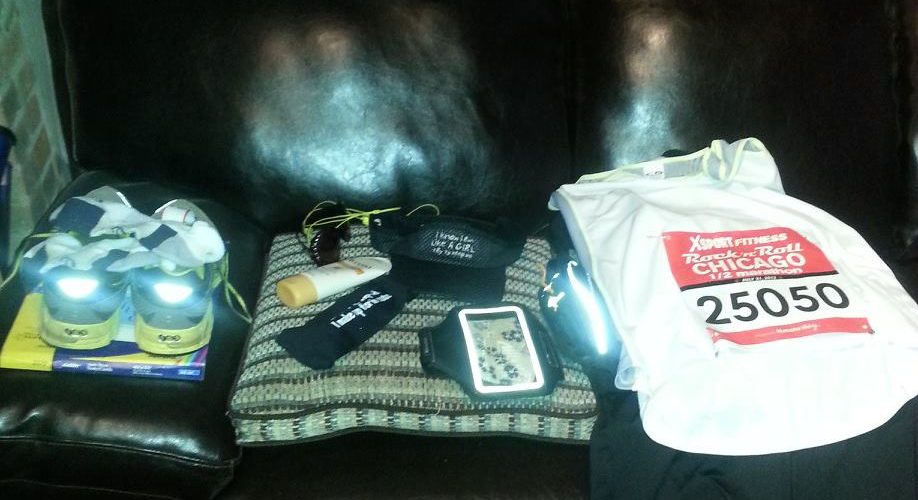In 2005, I ran a full marathon. That’s 26.2 miles. On foot.
At the time, I was excited to raise money for a charity, travel to San Diego, and do something that I believed would propel me into finishing things I started. No more procrastination. No more analysis paralysis.
I bought running shoes that should’ve been a lot cuter for the price. I solicited donations and attended the Saturday training sessions. These sessions mostly consisted of “runs” in the freezing cold with the wind blowing icy sprays from Lake Michigan on one side of my face, depending which direction I was going. (“Runs” is in quotes because I did a lot more walking than running.)
If you haven’t run a marathon before, because why would you, here’s the idea: The longer runs are to incrementally increase your mileage to help prepare for the big day. The shorter runs and strength training help with endurance and conditioning. Together, the short and long runs help prepare you to finish the race.
Preparation is absolutely necessary for getting big projects done, but we often skip it or wait until the last minute to get serious. As an adolescent, it was waiting until a day or two before it was due to start my term paper. I learned nothing from all the times I sat crying over blank index cards and typing paper! (Yes, typing paper! Don’t judge me!) As an adult, it was skipping steps while preparing for a marathon.
The race was scheduled for June 5th. In late February, the charity organizers gave us a calendar with suggested training days and mileage. Beginning in March they recommended 3 short runs per week, increasing mileage by small increments. Normally there was also one “long” run weekly. Those miles jumped exponentially each week to help prepare your body for long distance.
According to that schedule, the foundation of my preparation rested in those shorter runs. But to be best prepared, I needed to follow all the recommendations. My body needed the shorter runs which required consistency and held no glory. My mind needed to conquer those longer runs to build my confidence.
Unfortunately, I rarely showed up for the short runs. They were more frequent, called for me to shift my schedule, and they were solo. The long runs had an audience which helped motivate me, but the results on my body weren’t nearly as fruitful. Unaware of how much I need both types of preparation, I mainly showed up for the long runs.
I built my confidence without increasing my stamina.
I skipped necessary prep because I fell into the trap of what was “urgent” at the moment. I read an excellent book (more like a pamphlet) a few weeks ago, called The Tyranny of the Urgent. Basically, the urgent edges out the important because we’re accustomed to reactive living, not proactive. My marathon was important, but when the alarm clock went off early for a short run, sleep was “urgent” in that moment. I wasn’t counting the cost of putting off something important for what seemed urgent to me in that moment.
Another reason we don’t prioritize preparation is due to a lack of outward consequences. Even though I hadn’t sufficiently prepared to run 26.2 miles in one day, I hit the checkpoints in the required time necessary to finish the race, versus being rerouted for going too slow. I received the same medal as the person who finished in 3 hours, even though it took me over 7. For the most part, no one besides me knew I was underprepared and there was no difference in my reward.
How did I manage to finish? I met a woman around mile 16 and struck up a conversation. We encouraged each other for the final 10 miles and crossed the finish line together. She represented grace to me.
Grace allowed me to finish and get the reward, but left the choice of whether I’d be better prepared in the future up to me. Grace empowers and reveals the road, but places no demands on the direction we take. I wasn’t cured of ‘last minute prep’ syndrome by that one incident. But I turned a corner that day.
Now, I relish being prepared. I saw how folks who rarely worked behind the scenes showed up overly confident for the audience, but lacked the skills or stamina to get the job done. These days, I’m motivated by the stress of being unprepared, rather than the opportunity to impress an audience.
Do you have stories of being under- or over-prepared? Share them in the comments!


Once again, a great read!!!! This was right on time for me.
❤️ Thank you so much for your continued support! Glad that 26.2 miles can still encourage someone, because I don’t ever plan to do that again!